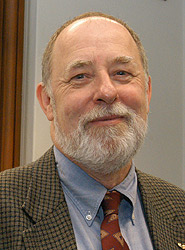Berkeleyan
Awards
Eight faculty members elected to top academies
![]()
02 May 2007
Seven scientists, scholars elected to American Academy of Arts and Sciences
Seven Berkeley faculty members, in company with the likes of former U.S.Vice President Al Gore, Google Chairman and CEO Eric Schmidt, and Berkeley alumna and chef Alice Waters, have been elected to the American Academy of Arts and Sciences, it was announced Monday, April 30.
Faculty members of this year's class are Alexis Bell, professor of chemical engineering and senior scientist at Lawrence Berkeley National Laboratory (LBNL); F. Michael Christ, professor of mathematics; Christopher Edley Jr., professor and dean of the School of Law (Boalt Hall); Saul Perlmutter, senior scientist at LBNL and a Berkeley professor of physics; Mary Eleanor Power, professor of integrative biology and director of the California Biodiversity Center; Jeremy Thorner, the William V. Power Professor of Biochemistry and Molecular Biology in the Department of Molecular and Cell Biology; and Margaret Weir, professor of sociology and of political science.
They are among 227 scholars, scientists, artists, civic, corporate, and philanthropic leaders from 27 states and 13 countries, ranging in age from 36 to 92. Represented among this year's newly elected members are individuals from 70 universities, including seven presidents or chancellors; more than a dozen corporations; as well as museums, research institutes, media outlets, and foundations.
"It gives me great pleasure to welcome these outstanding leaders in their fields to the academy," said academy president Emilio Bizzi. "Fellows are selected through a highly competitive process that recognizes individuals who have made preeminent contributions to their disciplines and to society at large."
Fellows and foreign honorary members are nominated and elected to the academy by current members. A broad-based membership, composed of scholars and practitioners from mathematics, physics, biological sciences, social sciences, humanities and the arts, public affairs, and business, gives the academy the capacity to conduct a wide range of interdisciplinary studies and public-policy research.
The academy will welcome this year's new class at its annual induction ceremony on Oct. 6 at the academy's headquarters in Cambridge, Mass.
Founded in 1780 by John Adams, James Bowdoin, John Hancock and others, the academy has elected as fellows and foreign honorary members the finest minds and influential leaders from each generation, including George Washington and Benjamin Franklin in the 18th century, Daniel Webster and Ralph Waldo Emerson in the 19th, and Albert Einstein and Winston Churchill in the 20th. The current membership includes more than 170 Nobel laureates and 50 Pulitzer Prize winners. An independent policy-research center, the academy undertakes studies of complex and emerging problems. Current academy research focuses on science and global security; social policy; the humanities and culture; and education.
For a complete list of this year's 203 new fellows and 24 new foreign honorary members, visit www.amacad.org/news/new2007.aspx.
Graham Fleming elected to National Academy of Sciences
Graham Fleming, the Melvin Calvin Distinguished Professor of Chemistry at Berkeley and deputy director of Lawrence Berkeley National Laboratory, is one of 72 new members of the prestigious National Academy of Sciences announced Tuesday, May 1, in Washington, D.C.
 Graham Fleming |
Fleming's election brings the total number of Berkeley academy members to 132. Members are chosen "in recognition of their distinguished and continuing achievements in original research," according to the academy.
Fleming is widely considered one of the world's foremost authorities on ultrafast interactions among the molecules in liquids, solids, and solutions. Using femtosecond lasers that flash a million billion times a second, he is able to obtain stop-action images of the individual steps in a chemical reaction, which helps to explain the dynamics of these reactions.
One of his goals is to develop artificial photosynthesis that would provide the world with clean, efficient, and sustainable energy. He was instrumental in developing a proposal for biofuels research at Berkeley that was recently chosen by energy giant BP to receive $500 million over 10 years.
Fleming also is director of the Berkeley branch of the California Institute for Quantitative Biomedical Research (QB3), one of four California Institutes for Science and Innovation created by the State of California in 2000. QB3 is a cooperative effort among UC Berkeley, UC San Francisco, UC Santa Cruz, and private industry to harness the quantitative sciences to understand biological systems at all levels of complexity.
The National Academy of Sciences, established by Congress in 1863, is a private organization of scientists and engineers dedicated to the furtherance of science and its use for the general welfare. Additional information about the academy and its members is available online at www.nasonline.org.
Two anthropologists to receive Carnegie scholarships
Two Berkeley faculty members are among 21 specialists in Islamic studies named as Carnegie Scholars this week, announced Carnegie Corporation of New York President Vartan Gregorian.
Saba Mahmood and Charles Hirschkind, associate professors in the Department of Anthropology, will each receive grants of $100,000 "to research themes relating to Islam and the modern world."
Mahmood's stated research theme, which will be advanced by her Carnegie scholarship, is "Defining the Secular in the Modern Middle East." Hirschkind's theme is "The 'Moorish Problem' and the Politics of Multiculturalism in Spain."
The Carnegie Scholars Program, launched in 1999, has since 2005 focused specifically on Islam because of the sponsors' belief in the importance of developing a deeper understanding of Islam and the modern world.
Says Mahmood: "This is the first time that this prestigious award has been presented to a Berkeley faculty member. It's a great honor to the campus, as well as to our Islam faculty and program."

